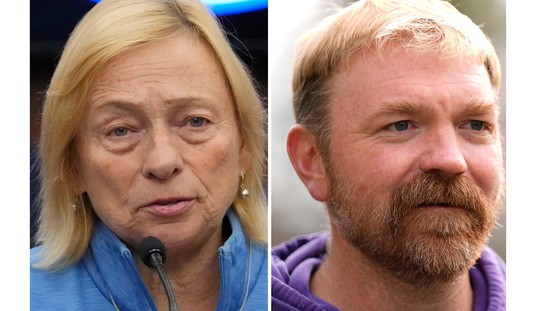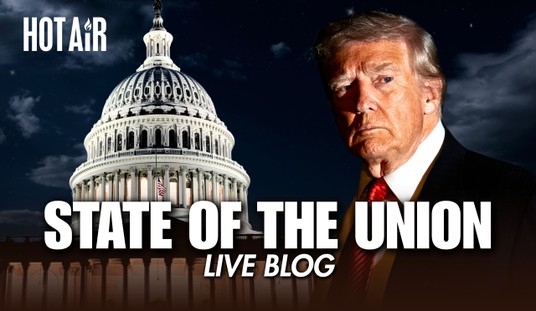If you read Ed’s post on Friday, you already know the background. Simple question for O: How many more really bad headlines like this one are you willing to tolerate in the name of loyalty?
The House Judiciary Committee is investigating whether Attorney General Eric Holder lied under oath during his May 15 testimony on the Justice Department’s (DOJ) surveillance of reporters, an aide close to the matter told The Hill…
“In regard to potential prosecution of the press for the disclosure of material – this is not something I’ve ever been involved in, heard of, or would think would be wise policy,” Holder said during the hearing.
However, NBC News reported last week that Holder personally approved a search warrant that labeled Fox News chief Washington correspondent James Rosen a co-conspirator in a national security leaks case…
“As we saw in Fast and Furious and are seeing now, Attorney General Holder refuses to hold himself accountable,” [Rep. Jim Sensenbrenner] said. “He misled the Judiciary Committee under oath when he said he had not heard about Fast and Furious and he misled us again when he claimed to be unaware of the AP scandal. The head of DOJ should be someone the American people can trust. Attorney General Holder should resign.”
He claimed he’d never considered prosecuting a journalist and yet he signed the warrant for Rosen’s e-mails that accused him of being a leak co-conspirator under the Espionage Act. “There is no other way to view this except as a lie,” said Ed. Not true, says Media Matters — if you read the fine print, you’ll see that Holder merely testified that he’d never gone after a reporter for disclosing classified material. Soliciting classified material, though? That’s a whole other ballgame:
In fact, the statements are not “incongruent” whatsoever. Holder’s comments to the Judiciary referred to the possibility of prosecuting journalists for publishing classified information, but that is not the crime the Justice Department’s warrant accused Rosen of committing. DOJ investigators were concerned with Rosen’s solicitation of classified information, not any subsequent publication of it…
In other words, Holder’s on-the-record denial of involvement in any prosecution of news organizations for publishing classified information in no way conflicts with any knowledge he may have possessed or action the DOJ may have taken against reporters for soliciting said information.
QED. Two obvious responses to that. One: If Holder’s defense to perjury boils down to a Clintonian parsing of precisely which leak-related crimes he’s considered jailing reporters for, he’s in more trouble than I thought. Of all the criticism I’ve read of his Rosen probe over the past week, I can’t think of a single piece, left or right, that argued the propriety of the warrant depended on whether Rosen was being accused of disclosing classified info to the public versus soliciting it. Holder may wriggle off the hook on the perjury charge due to the distinction, but imagine how it’ll play publicly to see the Attorney General resorting to weaselly rhetorical hair-splitting to defend the DOJ’s targeting of journalists. Two: What Holder said under oath at the hearing about never prosecuting a journalist for “the disclosure of material” can easily be read broadly to encompass a perjury charge. After all, Rosen was, potentially, going to be prosecuted for an act of “disclosure” — namely, his source’s disclosure of info to him. The statute is 18 U.S.C. 793(d), which prohibits a government source from leaking; the warrant suggested Rosen might be charged under 793(g) as a co-conspirator. When Holder said at the hearing that he’d never thought of prosecuting a reporter for “the disclosure of material,” did he mean disclosure by the reporter or disclosure to the reporter as well? If you think he meant both, then yeah, it’s perjury.
Beyond all that, this defense rests on the idiotic premise that as long as the feds don’t go after reporters for broadcasting classified information they’ve discovered, it’s kinda sorta okay to go after them for trying to discover it in the first place. If you’re locking up journalists for soliciting classified info, then you don’t need to lock them up for disclosing it. You’re simply punishing them on the front end instead of the back end. Is that what Holder’s planning to tell the House Judiciary Committee — that he’d never dream of interfering with a reporter’s transmission of a leak because … hopefully he’ll have already silenced that reporter for obtaining the leak to begin with? See now why maybe O’s thinking of nudging this guy toward the exit? Good lord, when even David Axelrod’s “disturbed” by what the DOJ did, who’s left for the White House to appease by keeping Holder on?
Update (Ed): Just one thing to keep in mind with all of this parsing about Holder’s nuance — the original question wasn’t nuanced at all. Rep. Hank Johnson, a Democratic ally of Holder, asked the question in a broad manner about prosecuting reporters under the Espionage Act of 1917, without any qualification. Holder in fact returned unbidden to that topic at the end of Johnson’s time, after first responding directly with “You’ve got a long way to go to try to prosecute the press for publication of material.” In his final answer, Holder replied:
In regard to potential prosecution of the press for the disclosure of material.This is not something I’ve ever been involved in, heard of, or would think would be wise policy.
That was categorical, broad, and entirely false.









Join the conversation as a VIP Member